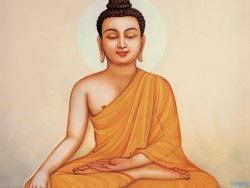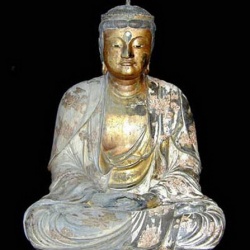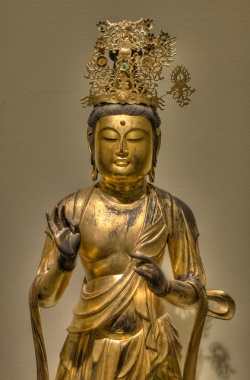Digha Nikaya, Sutta 1: The BrahmaNet Spell. Nidana
Digha Nikaya
Sutta 1
Brahmajala Sutta
BrahmaNet Spell
Partly translated from the Pali by Michael Olds, partly 'adapted/edited' from the Rhys Davids' translation
[1] I HEAR TELL:
Once Upon a Time, The Lucky Man was traveling along the Highway between Ragagaha and Nalanda with a large group of Beggars — Some 500 of them. And behind him, traveling along the same Highway was Suppiya the Wanderer and his young disciple Brahmadatta.
At this time Suppiya the Wanderer was speaking about the Buddha with many a disparaging word, while at the same time his disciple, Brahmadatta was responding using words of praise.
In this way the two of them, holding diametrically opposed views about him, were following in the very footsteps of the Buddha and that large group of Beggars on the Highway between Ragagaha and Nalanda.
[2] That night The Lucky man decided to stop at the Royal Resthouse in Ambalatthika park, and the large group of Beggars with him stopped there also, and so too did Suppiya the Wanderer and his young disciple Brahmadatta, and there, those two continued their debate as before.
[3] Then, in the very early hours of the pre-dawn, a number of Beggars gathered together in the meeting hall and this was the line of talk that arose among them:
"Isn't it wonderful! Isn't it marvelous, how The Lucky Man is one who so clearly delineates the various hearts of men? For here we have Suppiya the Wanderer speaking about the Buddha with many a disparaging word while his own disciple, Brahmadatta responds using words of praise; and the two, holding these diametrically opposed views about him, follow in the very footsteps of the Buddha and this large group of Beggars on the Highway between Ragagaha and Nalanda!"
[4] Then the Lucky Man, aware of the talk that had arisen amongst the Beggars, went to the meeting hall and sat down on the seat made ready. There he said: "What, Beggars, is the subject under discussion? What was the topic of conversation I interrupted?"
And they repeated to him what they had been saying, and he said:
[5] "Beggars, if those of other views should speak about the Tathagata in disparaging terms you should not for that reason get riled up, worked up, or upset, for if for that reason you were to get angry, resentful, and bear ill will, that would be an obstruction for you. If those of other views should speak about the Tathagata in disparaging terms and for that reason you were to get riled up, worked up, or upset would you then be able to determine how far what was said was well or badly said?"
"No, Sir."
"Well then, Beggars, when those of other views should speak about the Tathagata in disparaging terms you should simply break down the matter and explain that just this and that are not correct statements about the Buddha; just this and that are not to be found in him."
[6] And Beggars, if those of other views should speak about the Tathagata in terms of praise you should not for that reason be gladdened, pleased or smug, for if for that reason you were to be happy, excited, or elated, that would be an obstruction for you. If those of other views should speak about the Tathagata in terms of praise and for that reason you were to get happy, excited, or elated, would you then be able to determine how far what was said was well or badly said?
"No, Sir."
"Well then, Beggars, when those of other views should speak about the Tathagata in terms of praise you should simply break down the matter and acknowledge that yes, just this and that are correct statements about the Buddha; just this and that are to be found in him."


